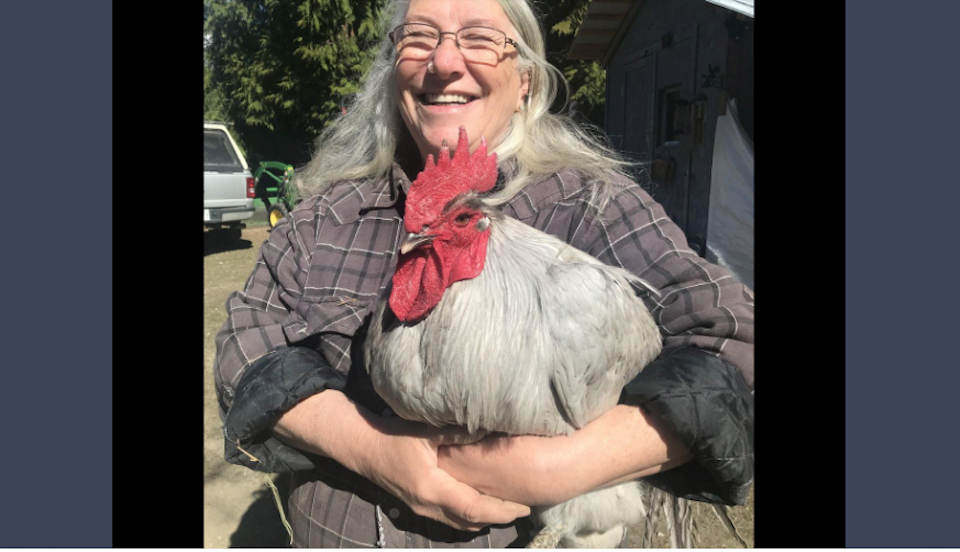Peggy Ife knew something was wrong the moment she walked into the chicken run on her Burton area farm on April 21.
“We saw a [dead] bird here and a bird there, about five or six,” she said. “We thought something had got into the yard. And we found a hole in the fence. So we thought that was it. We cleaned up the birds and put the others back in the coop.”
But the next day the birds were still exhibiting stress signs – some showed no interest in eating, or were huddled in corners of the coop.
“I knew something was wrong,” she says. “I call them ‘my girls’ – I spend enough time with my kids.”
Then more started dying.
“Friday night I found a couple on the floor that didn’t look right, and I thought, OK, this seems to be going past the ‘stress’ phase,” Ife recalls. “Then they started dropping, literally, dead.”
By the time the Canadian Food Inspection Agency (CFIA) inspectors arrived the next Monday morning, she had lost nearly 60 of her 70 birds.
It’s not been an easy time, and having to cull her whole flock is “devastating.”
“I’ve had birds since 2006. One that just passed away was born here in 2012. I have a goose that’s 14. My kids usually die of old age,” she says.
The inspectors arrived (“Really nice people, lots of information,” she says) and sampled her birds. A few days later, she received the news: her birds had H5N1, the virulent strain of avian flu.
Ife’s handful of remaining birds had to be put down, as a measure to stop the spread of the virus to more areas.
“My husband keeps looking at me, to see if I’m okay,” Ife told the Valley Voice the day before she received the news. “I’m hanging in there, but the more I think of what is going to happen – I’m sorry, when the time comes, I cannot be the one to put my babies down.”
Ife put her story on several community Facebook pages, and word spread to hundreds of backyard poultry keepers in the Valley Voice readership area to be on the lookout for avian influenza.
Avian influenza or ‘bird flu,’ is a contagious and lethal virus that can make birds sick or die. There are two strains of the disease, one mild and one virulent. Ife’s flock caught the latter, H5N1, thought to be coming north with the spring migration of wild birds.
Ife says she suspects that’s how her birds caught it.
“My wild bird feeders were all empty for a few weeks, so I decided to be nice, and fill them to feed the wild birds. And I have a lot of feeders,” she says.
Agricultural officials are urging owners of small or backyard flocks to continue to be vigilant and have appropriate preventative measures in place.
“Measures include eliminating or reducing opportunities for poultry to encounter wild birds, reducing human access to the flock, and increased cleaning, disinfection, and sanitization of all things (including clothing and footwear) when entering areas where flocks are housed,” the CFIA recommends.
Ife’s flock is not the only case of avian flu in BC. CFIA officials announced a week earlier a confirmed case in a backyard poultry flock in Kelowna. A dead bald eagle was also found in the Lower Mainland.
That’s where the biggest concern lies – the lower Fraser Valley is home to the province’s chicken industry. The last time avian flu swept through there, in 2004, 17 million birds had to be culled to save the industry.
Avian influenza is rare in humans and generally does not spread easily between people.
“During an outbreak of avian influenza in poultry, the risk to the general public is very low,” says the CFIA. “Most avian influenza viruses cannot spread easily from birds to people, or from person to person. However, any new influenza virus in the human population is a concern because of its potential to change and adapt for more easy transmission between people.”
In the meantime, Ife is pleading with her fellow poultry keepers in the region to do the right thing: remove sources of interaction between wild and domestic birds, and report any dead wild birds they may spot.
“If you have wild bird feeders, take them down,” she says. “If you want to free-range, there’s always the chance they will catch something. But if you have a run, make sure you have no bird feeders, and if you feed yours outside, make sure they clean it up before the wild birds come in. Bring your birds’ water source inside.”
While being ordered to cull her birds is hard, Ife says she did the right thing by reporting it.
“I understand why people wouldn’t want to report, because of that,” she says. “But if they don’t know where it’s happening, they can’t stop its spread.”



